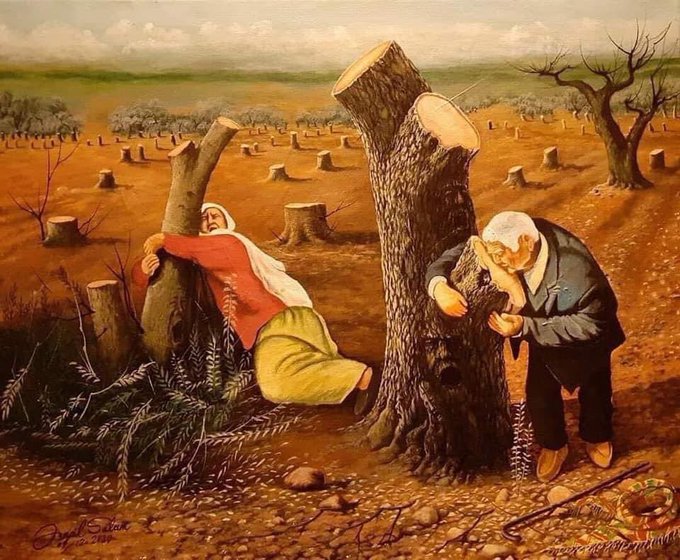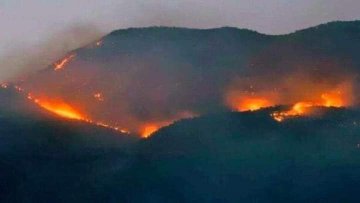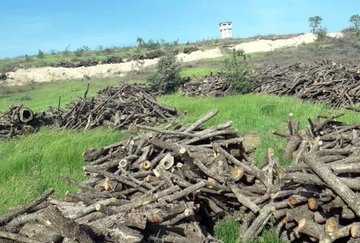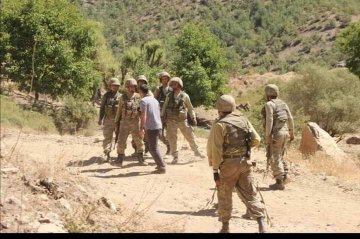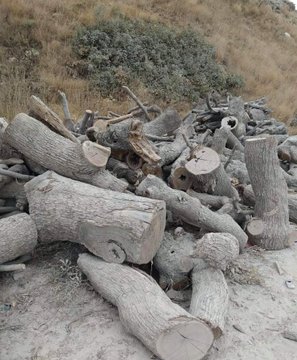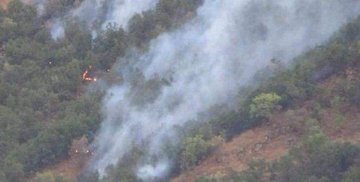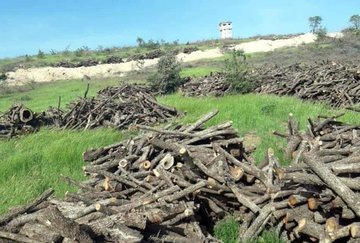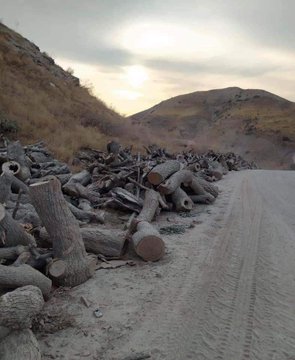Kamala Harris has no real power. She's v.p. You want to do something and keep it hidden? Hand it off to the veep, they're always invisible, no one cares about them. She seemed to think it would be a co-presidency and her most extreme supporters obviously thought that.
But the reality is it's a nothing job.
I like this Tweet from Franc Analysis:
The Rising was just surface level analysis about the latest gossip on Capitol Hill. Expect to see the same thing in Krystal and Sagaar's new show.
I agree. RISING was just an empty chat & chew aspiring to be MEET THE PRESS. It had no point and wasn't really left. Saager is a right-wingers. I'm not referring to him. I'm referring to what's supposed to be the left and was poorly represented by Krystal.
I also remember them gushing over that failed writer who was fired from multiple places for his plagiarism. It's like they never did a bit of research on anyone before they brought them on.
\Here's C.I.'s "Iraq snapshot:"
Thursday, June 3, 2021. Amnesty International and Human Rights Watch both issue alerts on Iraq and the editorial board of THE CHRISTIAN SCIENCE MONITOR weighs in -- been years since Iraq got that level of attention from the western world.
Let's start on a topic that's not Iraq, start with THE VANGUARD. I don't hate them. I called them out -- noting it was a peeve of mine -- for doing a segment on Rose McGowan and mispronouncing her name throughout the segment. I also called them out for not understanding her criticism of Alyssa Milano. But we noted them before that and we've noted them since. Even so, we get a few e-mails every week asking why I hate them?
I don't hate them. I'm just not impressed. Can they do good work? Yeah, they can. They usually do not do good work. Right now they've got a video lapping at Kyle Kulinski's nuts (which I'm sure he loves, he'll probably do another broadcast about his balls any day now -- THE TINY AND FEY BALLS OF KYLE, airing weekly on LIFETIME, TV for women). Oh, Kyle's so brave, he's so this, he's so that.
They're so stupid.
He's so brave and he stood up to THE HILL when they threatened him with a lawsuit?
Really?
He waited months to tell that tale, didn't he? Not very brave. When someone threatens to sue us, I don't fall silent. Robert Kagan misunderstands what we wrote here -- because someone played a prank on him -- and I'm noting it here. I am wording my reply to him in a dictated snapshot. David Sirota gets upset and says he's suing us, it's up here. Not months later, when it happens.
THE HILL is so mean thinking they own Krystal Ball!!!!
Well, when she was under contract, they did. That's what a contract is. If they gave permission for Krystal to do a podcast with Kyle, they gave permission and it going up at YOUTUBE, if already agreed to, shouldn't have been a problem. But Krystal worked for MSNBC and she knows what contracts are. So if permission was given, she should have known to get it in writing.
THE VANGUARD and Kyle are throwing all this junk out there trying to create sympathy for Krystal -- less so for Saager -- and it's not going to work.
I am sympathetic to Krystal and Saager. They did create the show and it appears that they were pushed out. At the very least, they were not appreciated. We are not noting RISING without them currently and I have no expectations that we will start noting RISING again. I am sympathetic to both Krystal and Saager.
I am sure there are many valid points to make with regards to how they have been treated.
But if you have someone under contract, yes, you do have the right to say yes or no to this or that. You're worried not just about tarnishing the brand but also diluting it. Issues like overexposure are real.
THE VANGUARD has two hosts who I am sure are very nice -- even though they apparently only know a tiny number of people who look like them, same skin color, same genitals, etc -- but they never do the work required.
The Sunday chat & chews? We didn't enjoy them from corporate media. Why would we support them on YOUTUBE? That's all THE VANGUARD does. It bloviates. Can they stop grabbing two-seconds of information that they then inflate into a ten minute segment which only demonstrates how little they know about anything?
I don't see the point in that. They know nothing about contracts and they're rushing to pimp a coward -- Kyle -- for his 'bravery' in coming forwards months after something happened. There was nothing brave about him coming forward. Nor was there anything brave about his 'standing up' to THE HILL and refusing to take his podcasts with Krystal down. THE HILL would have gotten bad publicity if they'd pushed and they knew that and he knew that.
As for THE HILL saying that Kyle could no longer be a guest on RISING after he and Krystal started their own show?
Exactly the right decision. RISING is part of THE HILL. It has to meet certain standards. You can't be bringing on a co-host's business partner on another venture to be a guest. It's a conflict of interest. It looks like you're promoting a product (Krystal and Kyle's show).
There used to be real rules about this in independent media. People miss that because Amy Goodman broke every one of those rules and PACIFICA was too scared to stand up to her (actually, Leslie Cagan pretty much ensured that Amy could not only steal millions from PACIFICA but also destroy the ethical guidelines in place). She broke every rule as she promoted her books, her book tours, her speaking gigs, over and over. There were real segments on breaking news during this time that were cut short so that Amy could tell you what cities she would be in on her book tour in the next two weeks -- they cut news segments short to do that.
There are rules.
THE VANGUARD hosts don't understand that. But if they're going to do a segment, maybe they need to do a little work on preparing for the segment which requires more than just repeating what one person says.
Equally true, their fawning over Kyle (they're in love again!!!!) was ridiculous and embarrassing.
Like ignorance, diseases spread. THE NEW ARAB reports:
The feared "black fungus" illness that has been gripped India has now killed two people in one area of Iraq, health officials have confirmed.
Dhi Qar Governorate health services spokesperson, Ammar Al-Zamili, acknowledged the deaths from the disease overnight Monday, according to The New Arab's Arabic-language service, Al-Araby Al-Jadeed.
He said the cases occurred in Nasiriyah, Dhi Qar's capital city but stressed that the illness is "very rare".
He said the disease is developed through "exposure to mould" in the soil and rotting fruit and veg, noting that those with conditions such as cancer and diabetes are most at risk.
Diseases spread. It often seems, throughout the world, that silence spreads as well. Self-imposed or intentionally blocked, needed information is not passed on. That explains a great deal of what takes place in Iraq and what has taken place in Iraq. Militias have never been the answer. But everyone wanted to grab quick term 'solutions' -- that's the press, that's the government. THE NEW YORK TIMES was happily pimping militias in the '00s. They praised, for example, the Sons of Iraq over and over. That was a militia. We called it out and we noted that the Sunnis were not erupting in joy, "We got our militias now!" No, they saw that as a threat to their own safety. But a militia might let Iraq turn a corner!!!! That was always the hope, that this or that thing would wash away the illegality of the Iraq War and make it all good. Fruit of the poison tree and all that, it was never likely to happen -- even in a world where anything can happen.
The Iraqi government picked up on short term 'solutions.' That's why the Shi'ite militias went from being disbanded and political parties being told they couldn't run for office if their party maintained a militia to the militias being brought into the Iraqi military. Now they're part of the government units. But there is no governmental control over them.
Amnesty International notes today:
On the fifth anniversary of the enforced disappearance of at least 643 Iraqi men and boys by Popular Mobilization Unit (PMU) militias during military operations to retake control of Fallujah from the so-called Islamic State group, Lynn Maalouf, Deputy Director for the Middle East and North Africa at Amnesty International said:
"For five years, the families of these men and boys have been living in anguish, not knowing the fate of their loved ones, or whether they are even alive. Young boys were ripped away from their parents and entire families torn apart. The families deserve to know what happened to their loved ones. They deserve an end to their suffering.
"To date, the Iraqi authorities have never publicly revealed the outcome of an investigation into disappearances and abuses committed during the retaking of Fallujah, leaving families in a perpetual state of limbo.
“The Iraqi authorities must end this anguish and reveal the fate and whereabouts of those forcibly disappeared by the PMU. We also urge the authorities to publicly disclose the findings of their official investigation and hold those responsible to account."
Background
On the morning of 3 June 2016, thousands of men, women and children fleeing the area of Saqlawiya in the Anbar region were met by a group of men armed with machine guns and assault rifles. Witnesses identified the armed men as members of the PMU based on emblems on their uniforms and flags. The armed men took an estimated 1,300 men and boys considered to be of fighting age away from their families. At sunset, at least 643 men and boys were boarded onto buses and a large truck. Their fate remains unknown. The remaining men were taken to what survivors described as the “yellow house”, where they reported being tortured and subjected to other ill-treatment.
On 5 June 2016, the Office of Iraq’s then-Prime Minister, Haider al-Abadi, set up a committee to investigate disappearances and abuses committed in the context of military operations to retake Fallujah. The committee’s findings have never been made public. The Iraqi authorities did not respond to Amnesty International’s request for information at the time.
The PMU are comprised of large, well-established militia groups and are legally considered part of the Iraqi Armed Forces.
If that alone doesn't drive home the problem with the militias in Iraq, maybe this will:
Iraqi Prime Minister Mustafa al-Kadhimi is threatening to submit his resignation to President Barham Saleh and the leaders of the Shia forces, unless the government gives him a free hand to rein in the actions of the Popular Mobilisation Forces (PMF), which are nominally affiliated with the leadership of the armed forces.
The PMF is formally linked to the commander-in-chief of the armed forces, a position held today by Kadhimi. But the PMF will follow Iran’s vision in all decisions. This is known in Baghdad and recognised by political parties.
“The political forces have been in continuous consultations since the armed parade held in the Green Zone,” a senior Iraqi government official told the Arab Weekly, adding that “In all circumstances, the government will not allow this kind of parade to happen again.”
According to the senior official, “Kadhimi has given President Barham Saleh and the leaders of the various Shia forces, the choice between him submitting his resignation or giving his government a free hand to hold accountable the abusers, the corrupt and those involved in terrorist crimes among the leaders and officers of the Popular Mobilisation Forces.”
That's from Masar Abdul Hassan Radi's column for ARAB WEEKLY. The editorial board of THE CHRISTIAN SCIENCE MONITOR weighs in with:
Young people in Iraq, whose protests in 2019 brought a democratic reformer to power, are holding their breath. On May 26, for the first time the Iraqi government arrested a senior commander of a pro-Iran militia and – here is the breath-holding part – he has not been released more than a week later. In addition, an attempt by the commander’s militia to besiege the capital and pressure his release was repelled by elite Iraqi forces.
While the arrest of Qasim Muslih on terrorism charges is small on a global scale, it represents a significant advancement in rule of law and accountability in a country pivotal to the growth of democracy in the Middle East. No senior member of the many Iran-backed militias that reject government control has been held accountable for the killing of pro-democracy activists over the past two years. And previous attempts at arresting the militia members of Mr. Muslih’s Kataib Hezbollah group ended up with them being quickly released.
His arrest is even more significant as it comes just four months before parliamentary elections, giving hope that voters and candidates can enjoy peaceful campaigning and that the integrity of the electoral process will be upheld.
“Either the state proceeds to sovereignty and order, or the state falls on everyone’s heads,” tweeted a former prime minister, Haider al-Abadi, after the arrest. He added that “no one is above the law.”
THE NEW ARAB notes, "Last year, Iraqi forces raided an Iran-backed militia's stronghold in Baghdad and arrested more than a dozen members of the group. The arrested men were let go after unidentified gunmen drove to government buildings in Baghdad's Green Zone to demand their release." And Dilan Sirwan (RUDAW) reminds:
According to a 2016 report
from Human Rights Watch, militias belonging to the PMF, also known as
Hashd al-Shaabi or the Popular Mobilization Units (PMU), entered the
district alongside Iraqi federal police and detained at least 1,700
men.
A day later, 605 detainees were released for medical treatment – many of
them bearing the marks of rape and torture. According to the watchdog,
at least four men died under torture. Some of them had been dragged behind vehicles. Another later died in hospital.
The PMF had a database of wanted individuals. As families fled the
fighting and crossed PMF lines, their names were checked with the
database. If a name matched, the men of the household were arrested and
taken to an undisclosed location.
Human Rights Watch has accused
the PMF militias, many of which are Shiite, of committing war crimes by
destroying Sunni homes and executing civilians accused of ISIS
affiliations.
In other news, Human Rights Watch issued the following nine hours ago:
Recent camp closures have stripped thousands of displaced people of essential services during the Covid-19 pandemic, with inadequate government plans for their return home, Human Rights Watch said today.
The Iraqi government’s plan to end the prolonged displacement of families who were uprooted by fighting between the Islamic State (ISIS) and anti-ISIS forces will only succeed if the government ensures that families recently evicted from camps for displaced people can safely return to their previous homes or go to new shelters, with full access to electricity, water, and healthcare services.
“After these families’ years in limbo, it is positive that the government is trying to find durable solutions for families displaced by fighting,” said Belkis Wille, senior crisis and conflict researcher at Human Rights Watch. “But this strategy will only succeed if it builds on lessons learned from previous camp closures and forced returns in which aid was cut off and people were left completely on their own.”
In March 2021, the Iraqi government endorsed a National Plan to Address Displacement in Iraq drafted by the Ministries of Planning and of Migration and Displacement. But the government has closed 16 camps over the last seven months, leaving at least 34,801 displaced people without assurances that they can return home safely, get other safe shelter, or have access to affordable services. Only two camps remain open in Baghdad-controlled territory, one in Nineveh and another in Anbar, and they are also set to close.
The Migration and Displacement Ministry announced the closures in mid-October 2020 and closed 16 camps by January 2021. Many residents were female-headed households displaced by fighting between ISIS and the Iraqi military from 2014 to 2017, and many of these families are being labeled as ISIS-affiliated. The Kurdistan Regional Government has not shut down camps in areas under its control.
These closures proceeded despite the ongoing Covid-19 pandemic, during which the government put in place numerous lockdowns and other movement restrictions. In 2020, Covid-19 killed over 12,526 people in Iraq and the pandemic continued to plague the country in 2021, with the latest death toll reaching 16,267.
Despite the government’s stated aim to have displaced people return home, administrative hurdles prevent families with perceived ISIS-affiliation from getting documents, including identity cards, birth certificates, and ration cards. This blocks both their safe return and access to welfare benefits and government services.
The authorities and communities are labeling people as ISIS-affiliated based on suspicions that a relative joined ISIS or was sympathetic to the group. They are often applying these labels without any evidence that the people themselves showed sympathy to or joined the group or committed a crime. There is no way for people to appeal this label.
Some local authorities are also applying Law No. 20, Compensating the Victims of Military Operations, Military Mistakes and Terrorist Actions in 2009, in a discriminatory manner, excluding families with perceived-ISIS affiliations. The law is supposed to compensate anyone who has experienced property destruction, injury, and loss of life if the property was destroyed by fighting, regardless of the reason or which warring party destroyed it.
While many families have applied for but have not yet received any compensation, the authorities are preventing some families with perceived-ISIS affiliations from applying. As a result, many do not have the resources to rebuild their homes.
A report published in December 2020, based on interviews with 2,764 families by a range of international humanitarian organizations, captures their plight. The interviews were conducted from September 2019 to November 2020 in the two weeks after these families’ evictions. Almost a third of the families said that they had not wanted to leave the camp, and just over a third said that they had not returned to their areas of origin, with most saying this was because their properties were destroyed.
Of those who returned, only a third were living in their own homes, with the rest renting, hosted by others, or squatting in unfinished or abandoned buildings. Twenty percent said they feared being evicted by security forces or their local community because of their perceived ISIS-affiliation. Half of the families evicted said they did not have access to enough food to meet their basic needs, and over a third said they did not have adequate access to drinking water.
From November 2020 to May, Human Rights Watch interviewed 14 people from Nineveh, Salah al-Din, and Anbar governorates who had lived with their families in camps since 2016, all with perceived ISIS ties, and who were evicted. The families raised similar concerns. None had been able to move back into their old homes and eight said they were not able to return to their areas, fearing being threatened, arrested, or harmed, and had to rent homes elsewhere. They said they were concerned they would not be able to afford rent in the coming months.
“I can’t even afford my share of the rent,” said a woman with five children sharing a two-bedroom rental with three other families, a total of 15 people. “I depend on what people and charities give me to pay it. I am a widow, with no adult male in the family, so it’s difficult for me to find work. I am constantly afraid of us getting evicted.”
The families who could return to their home areas were from the Shirqat district and Yathrib subdistrict in Salah al-Din, a governorate with significantly less support from international nongovernmental organizations for displaced families. One man said that his house is occupied by another family in his village and because of his perceived links to ISIS he has been unable to get authorities to remove the family.
The other five said their homes had been completely destroyed and they couldn’t afford to rebuild them. They were living in tents, relatives’ houses, or in one case renting a home in another city. All were struggling to provide their families with adequate food, water, electricity, and health care.
In a positive step, in the one remaining camp in Nineveh, south of Mosul, in March 2021, the UN refugee agency (UNHCR), the International Organization for Migration, the nongovernmental organization INTERSOS, and the Displacement and Migration Ministry created a committee to discuss the barriers that prevent the displaced families from returning to their homes and to help them find durable solutions that will allow them to leave the camp.
The Iraqi government should not close the remaining camps unless the authorities are able to ensure access to durable solutions including availability of basic Covid-19 mitigation measures such as adequate shelter and water, Human Rights Watch said.
Meanwhile, as part of the new national strategy, the authorities should engage with families living in protracted displacement in the camps and elsewhere to help them get any documentation they are still missing, understand why they have been unable to return home and where they would like to live, and ensure that regardless of where they settle they have affordable access to shelter and basic services. The government should investigate allegations of discrimination by public authorities, including the discriminatory application of the 2009 compensation law.
“If the government really wants to close the displacement file then
it should start working on making sure that displaced families actually
have the ability to resettle safely, whether back to their homes or
elsewhere,” Wille said. “This means ensuring that they have the basics –
food, water, a roof over their head.”
Security Clearance and Documentation
In many areas with a former ISIS presence, the authorities have put in place a “security clearance” system that requires all residents to obtain a stamp from security forces in their area before they can apply for civil documents they are missing. This applies to most families who lived under ISIS for an extended period.
Security forces routinely deny the stamp to people if a family member is suspected by security forces or the local community to have joined ISIS or been sympathetic to the group, and their name is on a wanted list. Or, in some areas, they require the families to open a criminal complaint against that relative to get the stamp. Iraqi law does not justify preventing these families from accessing their documents, which is a form of collective punishment. There is no process for appealing the denial.
Families without the stamp cannot renew their documents and often cannot return home. People are usually required to show their documentation when passing through the many checkpoints throughout Iraq. Recognizing this barrier, after years of inaction, the authorities sped up processes for families to obtain their documentation in at least two of the camps that closed.
However, three people interviewed said they were still missing at least some of their documents when authorities evicted them from camps. One father said that because the authorities accused his relative of ties to ISIS he was worried about leaving his village to look for a job in a bigger town because security forces might see his name on a wanted list and arrest him.
The three people could not get ration cards for the government program that provides food items to almost all Iraqis. The father said the authorities had refused to renew his family’s ration cards: “It is neither my nor my children’s fault that our relative joined ISIS. Why are we being prevented from receiving rations like any other Iraqi?”
A woman from a village in Salah al-Din but living in Kirkuk governorate said her family could not return to Salah al-Din to renew their ration cards because they do not have valid civil documentation to pass through the many checkpoints. Her husband is unable to find work in the village where they are living and she said, “I don’t know how I will get food for my children once the food I have now runs out.”
Another woman said that since she and her family returned to their home village she cannot relocate them somewhere with better services and job prospects because she has been unable to obtain security clearance necessary for getting documents for her three young children:
Here in the village, it looks like a desert and there isn’t enough electricity or access to food or health facilities. We haven’t received any assistance since we arrived. And we haven’t been able to get any rations from the government – local authorities are refusing to renew our ration cards because they say we are linked to ISIS.
One woman said her family returned to their village and set up a tent next to the rubble of their destroyed home, but a village leader threatened to evict them unless they sold him their land.
Our land is worth 20 million IQD (US$13,590) but he is only offering half. The security forces in the area know he is threatening us but will not intervene. We also own a plot of farmland and other villagers are farming it and refusing to give us any proceeds or give it back to us.
Access to Compensation, Shelter, Water, Electricity, Health Care
Families across Iraq whose homes were destroyed by fighting have filed compensation claims under the 2009 compensation law, which compensates anyone for property destruction, injury, and loss of life, regardless of the reason the property was destroyed by fighting, and regardless of which warring party destroyed it. However, Human Rights Watch has heard for years from Iraqis who say that families with a member on a wanted list for ISIS affiliation have been barred from receiving such compensation.
In a news conference on January 31, a senior commander from the Anbar Operations Commander, an integrated military and security command in Anbar, criticized security forces and community leaders for allowing families with perceived ISIS affiliation to return to their home areas and to apply for compensation. He said his command would continue to “track” and “chase” families with perceived ISIS affiliation in part to ensure they could not receive any compensation for property damage. He threatened that security forces and community leaders who endorsed their compensation claims would be arrested, saying, “Those who killed us and destroyed our houses won’t be allowed to receive any money from the state.”
Human Rights Watch has not been able to identify any legal basis for denying people with relatives wanted for a crime access to compensation under the law.
Twelve of the people interviewed said they were unable to apply for compensation because of their alleged family ties to ISIS. A woman with three children said that both the mayor and security forces in her village refused to give her security clearance or let her apply for compensation because of a relative’s alleged ties to ISIS:
My home is destroyed, and we have had to set up our tent near the house of my relative where we are not allowed to build a toilet or shower. We own another plot of land in the middle of the village, but another family is occupying it claiming it is theirs and won’t let us put our tent there. Because of my situation, the security forces won’t do anything about it. So, I have to collect buckets of water from my relative’s house and we only have electricity for few hours per day.
All the families said they lacked regular access to running water, an elevated concern given the ongoing Covid-19 pandemic.
The six interviewees who had returned to Salah al-Din said they did not have adequate access to water and electricity. A man with a wife and child said that the authorities had informed him that his family must leave the camp where they were living within seven days. They told him they would either transport him with his belongings to his village or force him out of the camp right onto the street, so he agreed to return to his village:
Once we arrived we saw that it wasn’t a village anymore, it was a desert. The homes were all destroyed and there was no water or electricity, the networks had been destroyed by the military operations. I set up a tent next to the rubble of my old home and went to collect water from an agricultural project about 300 meters away, even though I know this water is not safe for drinking. I wanted to purify the water but I couldn’t find water filter pills anywhere.
After 10 days I decided to leave the village, where there were no job opportunities or assistance, and move to a city where there are services. The camp was better for us, I had a job there and we were receiving food and hygiene kits and didn’t have to pay rent. Given that, I cannot understand why the authorities would have forced us to return to a village with no standing homes and no services.
Another women from Salah al-Din said that in her family were no longer able to keep clean because they had run out of hygiene kits and soap they had taken with them from the camp.
Six said they ended up in areas without adequate healthcare facilities. One woman with four children said that her family was forced to return to a village with no clinic whereas in the camp she could just walk over to the health center.
Eight of the families did not return to their areas and moved elsewhere in the country. The families that left the camps and resettled in Mosul said that authorities in the city allowed them to resettle there despite communities stigmatizing them for perceived links with ISIS. All eight said they were struggling to provide their families with adequate food, water, electricity, and health care. One woman said:
I am now renting a house with two other families. In the camp, we used to live in peace and dignity. Now I am struggling to think about how I will pay for the rent, electricity, water, and food. In the camp we got all of these for free. If the government can’t make our home areas safe for return, they should let us stay and live in the camps.
New content at THIRD:
- Truest statement of the week
- A note to our readers
- Editorial: What do you do while the Kurds are pers...
- TV: Streamers building reputations
- He's not the president
- A book to avoid (Dona)
- The dishonor goes to . . . AOC
- KINDLE UNLIMITED (Dona, Ava and C.I.)
- Tweet of the week
- Books
- Funniest Tweet of the week
- This edition's playlist
- Highlights
The following sites updated:


